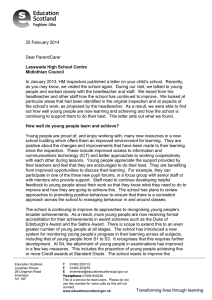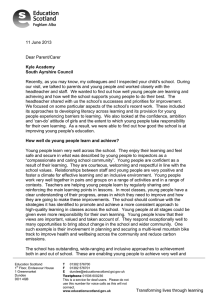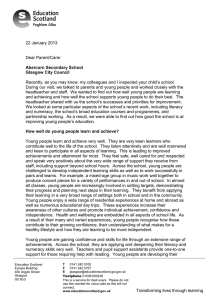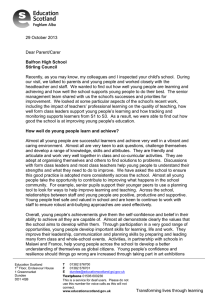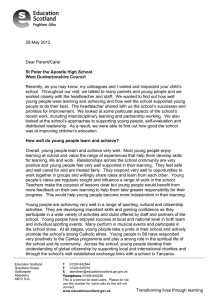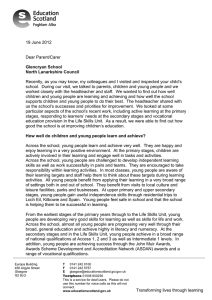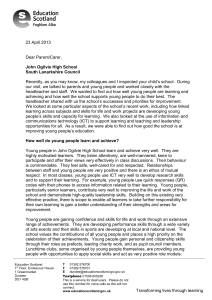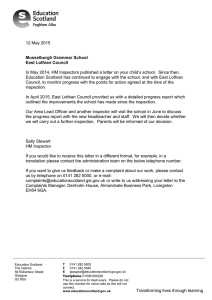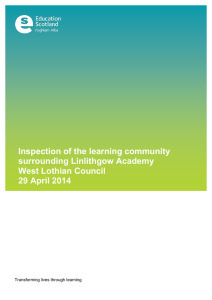29 April 2014 Dear Parent/Carer ’s school. During
advertisement
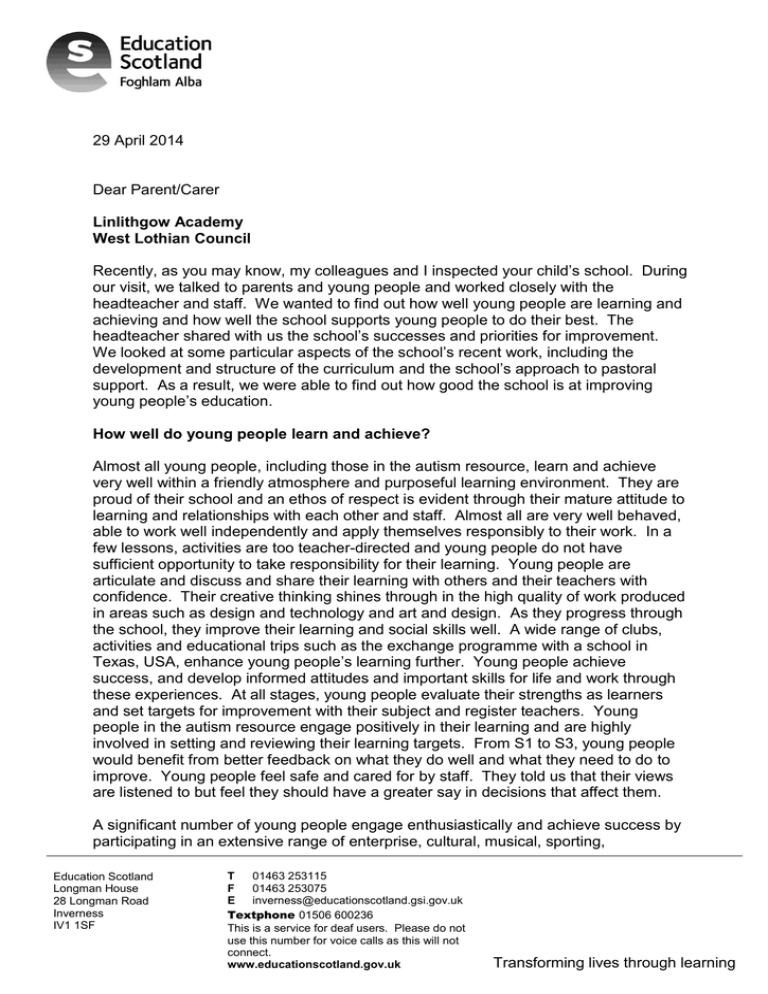
29 April 2014 Dear Parent/Carer Linlithgow Academy West Lothian Council Recently, as you may know, my colleagues and I inspected your child’s school. During our visit, we talked to parents and young people and worked closely with the headteacher and staff. We wanted to find out how well young people are learning and achieving and how well the school supports young people to do their best. The headteacher shared with us the school’s successes and priorities for improvement. We looked at some particular aspects of the school’s recent work, including the development and structure of the curriculum and the school’s approach to pastoral support. As a result, we were able to find out how good the school is at improving young people’s education. How well do young people learn and achieve? Almost all young people, including those in the autism resource, learn and achieve very well within a friendly atmosphere and purposeful learning environment. They are proud of their school and an ethos of respect is evident through their mature attitude to learning and relationships with each other and staff. Almost all are very well behaved, able to work well independently and apply themselves responsibly to their work. In a few lessons, activities are too teacher-directed and young people do not have sufficient opportunity to take responsibility for their learning. Young people are articulate and discuss and share their learning with others and their teachers with confidence. Their creative thinking shines through in the high quality of work produced in areas such as design and technology and art and design. As they progress through the school, they improve their learning and social skills well. A wide range of clubs, activities and educational trips such as the exchange programme with a school in Texas, USA, enhance young people’s learning further. Young people achieve success, and develop informed attitudes and important skills for life and work through these experiences. At all stages, young people evaluate their strengths as learners and set targets for improvement with their subject and register teachers. Young people in the autism resource engage positively in their learning and are highly involved in setting and reviewing their learning targets. From S1 to S3, young people would benefit from better feedback on what they do well and what they need to do to improve. Young people feel safe and cared for by staff. They told us that their views are listened to but feel they should have a greater say in decisions that affect them. A significant number of young people engage enthusiastically and achieve success by participating in an extensive range of enterprise, cultural, musical, sporting, Education Scotland Longman House 28 Longman Road Inverness IV1 1SF T 01463 253115 F 01463 253075 E inverness@educationscotland.gsi.gov.uk Textphone 01506 600236 This is a service for deaf users. Please do not use this number for voice calls as this will not connect. www.educationscotland.gov.uk Transforming lives through learning volunteering and leadership activities and events. They gain a wide range of important skills through their involvement in these activities, such as teamwork and are developing well as young citizens. Their many achievements are recognised through the school’s merit system, annual awards ceremony, local and national trophies and a range of media including the recent national television broadcast of the S6 pupils’ ‘Teen Canteen’ enterprise project. Young people in the autism resource won an award to display their photographs in athletes’ rooms at the 2014 Commonwealth Games. A number of young people achieve success in a range of award programmes, including the Duke of Edinburgh’s Award Scheme and Sports Leadership Awards. Those in the autism resource achieved a John Muir award as part of their outdoor learning activities. Young people at the senior stage express themselves well and take on a high level of responsibility for their younger peers and the wider community. The school is aware of young people’s involvement in wider activities through its profile management and pupil tracking system (PROMPTS). Young people from S1 to S3 are progressing well across their learning with strong progress being made in a number of subject areas such as art and design and science. Most young people attending the autism resource have made significant progress in literacy and numeracy from prior levels of attainment. From S4 to S6, young people achieve very highly in national examinations. The school has significantly improved performance from a consistently high level in the last five years. In almost all key measures, the school performs well above national averages and significantly better than in schools which serve young people with similar needs and backgrounds. The quality of young people’s attainment has improved notably, with significant numbers achieving Credit level and grade A Intermediate and Higher awards. The proportion of young people achieving an Advanced Higher is more than twice the national average and well above schools which serve young people with similar needs and backgrounds. Almost all young people are successful in moving on to employment, training or further learning on leaving school. The proportion of young people leaving school to progress onto higher education is significantly higher than the national average. How well does the school support young people to develop and learn? The high-quality support which young people receive to help them develop and learn is a major strength of the school. Pastoral and pupil support staff make effective use of PROMPTS to share very useful information with staff to help them support young people’s learning. Teachers are proactive in using PROMPTS to report any concerns and to access relevant information to meet young people’s needs in the classroom. Support staff work very effectively with a range of specialist partners to access appropriate support, particularly for those young people with the greatest needs. There are particularly effective arrangements to support young people in moving from P7 to S1. Across the school, in most lessons young people undertake tasks, activities and resources which meet their needs well. There is scope to challenge young people more by developing their inquiry and critical thinking skills through effective questioning and increasing the pace of learning. In the autism resource, the pace of learning and level of challenge is appropriate for all individuals. Young people speak positively about the extra out-of-class help they receive from teachers with their work. The school’s partnership work with Skills Development Scotland is providing very good support to those leaving school. 2 The school is working successfully to provide a curriculum which aims to meet the needs, interests and aspirations of all young people in Linlithgow Academy. The rationale for the curriculum is strongly influenced by educational research and national guidance resulting in staff having a clear understanding of what the curriculum aims to achieve. The school now needs to re-engage with parents and young people to develop a shared understanding of the opportunities the curriculum provides from S1 to S6. Teachers work confidently with the Curriculum for Excellence guidance to plan learning and for progression from S1 to S3 and into the senior phase. Young people are provided with a range of opportunities for choice, specialisation and depth whilst maintaining experiences within all curriculum areas. They would benefit from more planned opportunities to link different areas of their learning to develop, reinforce and deepen understanding. In S3, young people can choose to continue to study two modern languages or elect to participate in learning leading to an accredited award such as a Sports Leadership award. The curriculum from S4 to S6 allows young people to work towards National Qualifications over one and two-year courses of study. This flexible approach is providing opportunities for young people to deepen their learning and is meeting their needs well. The school needs to do more to explain the benefits of these approaches to parents. The school is increasing opportunities for young people to study a range of short and vocational courses. The school plans to review the curriculum to ensure that young people from S1 to S6 benefit fully from all the key aspects of Curriculum for Excellence, for example development of their health and wellbeing. The autism resource provides young people with a suitable blend of individualised support within a small group setting, along with access to a good range of curriculum areas delivered by subject teachers. How well does the school improve the quality of its work? We are confident that the school has the capacity to improve further the quality of its work. The headteacher demonstrates a determination to achieve the highest standards for all through the opportunities afforded by Curriculum for Excellence. He has been well supported by the depute headteachers, principal teachers and other staff. Staff across the school are committed to ensuring young people learn and achieve very well. Principal teachers use a range of evidence to evaluate the experiences they provide for young people in their specialist areas, and this has led to continuing improvement. Staff involved in local and national development groups, such as National Qualification design teams, use these experiences to good effect to improve learning, teaching and assessment in their subject areas. The ‘S6 Legacy’ review allows young people to use their experience to influence improvements such as the level of support given to school leavers regardless of their destination. The school has recently revised approaches to evaluating its own work. These need to be used consistently and more effectively across the school to bring about continuing improvement in young people’s experiences and achievements. Parents would welcome more information about their children’s progress. Overall, the school needs to continue to increase the role of young people, parents, staff and community partners in school improvement. This inspection found the following key strengths. Young people’s outstanding attainment. Well-mannered, articulate young people who are highly motivated to learn. 3 The high quality of pupil support provided by staff across the school, including in the autism resource. The overall leadership provided by the headteacher, including driving improvements to the curriculum. We discussed with staff and West Lothian Council how they might continue to improve the school. This is what we agreed with them. Continue to improve the quality and consistency of young people’s learning experiences through more focused self-evaluation. What happens at the end of the inspection? We are satisfied with the overall quality of provision. We are confident that the school’s self-evaluation processes are leading to improvements. As a result, we will make no further evaluative visits in connection with this inspection. During the inspection, we identified an aspect of innovative practice which we would like to explore further in order to share it with others. As a result, we will work with the school and West Lothian Council to record and share the innovative practice more widely. Fiona Robertson HM Inspector Additional inspection evidence, such as details of the quality indicator evaluations, for your school can be found on the Education Scotland website at http://www.educationscotland.gov.uk/inspectionandreview/reports/school/primsec/Linlit hgowAcademyWestLothian.asp If you would like to receive this letter in a different format, for example, in a translation please contact the administration team on the above telephone number. If you want to give us feedback or make a complaint about our work, please contact us by telephone on 0141 282 5000, or e-mail: complaints@educationscotland.gsi.gov.uk or write to us addressing your letter to the Complaints Manager, Denholm House, Almondvale Business Park, Livingston EH54 6GA. 4
